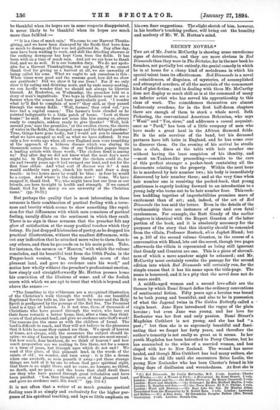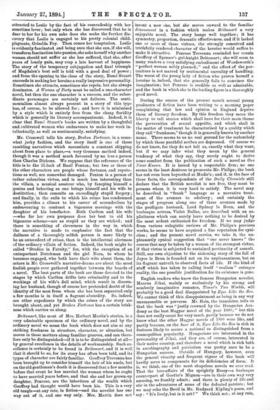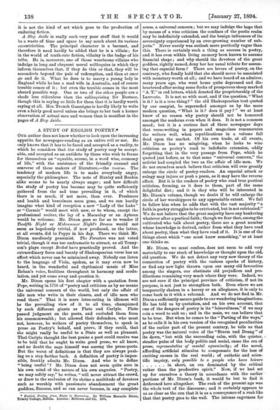RECENT NOVELS.*
THE art of Mr. Justin McCarthy is showing some unwelcome signs of deterioration, and they are more obvious in Red Diamonds than they were in The Dictator, for in the new book he forsakes, not partially but entirely, the genial comedy in which he is at home for a cheap kind of melodrama in which his special talent loses its effectiveness. Red Diamonds is a novel of coincidences, of disguises, of mysteries, of accomplished and attempted murders, of all the materials of the commonest kind of plot-fiction ; and in dealing with them Mr. McCarthy does not display so much skill as is at the command of many an inferior artist who has served his apprenticeship to this class of work. The coincidences themselves are almost ludicrously overdone, for in the first half-dozen chapters there are enough of them to stock a whole novel. Seth Pickering, the conventional American Bohemian, who says "Waal" and "Yes, siree," and addresses a casual acquaint- ance as " Pard," has been of a little company of men who have made a great haul in the African diamond fields. He is the sole survivor of the band, but his deceased partners have left heirs in England, and he has come over to discover them. On the evening of his arrival he strolls into a club, dines at the table with heir number one without having the least suspicion of his identity, and —most un-Yankee-like proceeding—commits to the care of this perfect stranger a pocket-book containing all the documents relating to the property. Within the next hour he is murdered by heir number two ; his body is immediately discovered by heir number three; and at the very time when heir number one is receiving the pocket-book, that young gentleman is eagerly looking forward to an introduction to a young lady who turns out to be heir number four. This reck- less huddling together of improbabilities promises more of excitement than of art; and, indeed, of the art of Red Diamonds the less said the better. Even in the details of the workmanship there are instances of gross and even fatal • carelessness. For example, the Ratt Gundy of the earlier chapters is identical with the Rupert Granton of the latter portion of the book, and it is absolutely necessary for the purposes of the story that this identity should be concealed from the villain, Professor Bostock, alizs Japhet Bland; but on p. 163 of the second volume Granton, in the course of a conversation with Bland, lets out the secret, though two pages afterwards the villain is represented as being still ignorant that Gundy and Granton are one. This is a piece of slovenli- ness of which a mere amateur might be ashamed ; and Mr. McCarthy must certainly rewrite the passage for the second edition into which Red Diamonds will certainly run, for the simple reason that it has his name upon the title-page. The name is honoured, and it is a pity that the novel does not do it more credit.
A middle-aged woman and a second love-affair are the themes by which Esme Stuart defies the ordinary conventions of sentimental fiction. Fifty years ago a heroine was bound to be both young and beautiful, and also to be in possession of what the Jagenal twins in The Golden Butterfly called a • virgin heart. Jane Eyre introduced the vogue of the plain heroine ; but even Jane was young, and her love for Rochester was her first and only passion. Rime Stuart's Magdalen Cuthbert is not young, and she has had "a past ; " but then she is so supremely beautiful and fasci- nating that we forget her forty years, and therefore the author's temerity is not really so great as it seems. In her youth Magdalen has been betrothed to Percy Chester, but he has succumbed to the wiles of a married woman, and has eloped with her to New Zealand. The wound has never healed, and though Miss Cuthbert has had many suitors, she lives in the old life until she encounters Brice Leslie, the young New Zealander who has been Chester's friend in his dying days of disillusion and wretchedness. At first she is
• (L) Rod Diamonds. By Justin McCarthy, M.P. 3 vols. London : Ghetto and Windns.—(2.) A Woman of Forty : a Monograph. By Esmi Stuart. 2 V0113. London : Methuen and Co.—(3.) Broken Fortunes. By Henry OresswelL 3 vols. London : Hurst and Blackett.—(4.) Britomarl. By Mrs. Herbert Martin. 3 vols. Louden : R. Bentley and Son.—(5.) One Never Knows. By F. C. Philips. 3 vols. London : Ward and Downey.—(6.) Eyes Like the Sea. By Maurits Mrai. Translated from the Hungarian by B. Nesbit Bain. 3 vols. London : Lawrence and Bullen.—(7.) A Step Aside. By Gwendolin Douglas Dalton (Mrs. Trench Gascoigne). 3 vols. London: Horace Cox.
attracted to Leslie by the fact of his comradeship with her sometime lover; but only when she has discovered that he is dear to her for his own sake does she make the further dis- covery that Leslie is engaged to his pretty colonial child- playmate, Griselda Foy. Then comes her temptation. Leslie is evidently fascinated and being sure that she can, if she will, transform fascination into passion, she asks herself why another woman should not suffer as she has suffered, that she, after years of lonely pain, may reap a late harvest of happiness. The story of the temporary subjugation and final triumph of Magdalen's best self is told with a good deal of power ; and from the opening to the close of the story, Esme Stuart succeeds in making her heroine a really impressive personality. Sometimes she attracts, sometimes she repels, but she always dominates. A Woman of Forty must be called a one-character novel, but then the one character is a success, and the subor- dinate personages are certainly not failures. The senti- mentalism almost always present in a story of this type has, of course, to be allowed for ; and here it is minimised by a style which is entirely free from the cheap floridity which is generally its literary accompaniment. Indeed, it is clear that Rime Stuart's books are written by a thoughtful and cultivated woman who endeavours to make her work in- tellectually, as well as sentimentally, satisfying.
Mr. Cresswell tells his story, Broken Fortunes, in a some- what jerky fashion, and the story itself is one of those rambling narratives which necessitate a constant skipping about from place to place,—a very tiresome method indeed, though it was a method much favoured by no less a person than Charles Dickens. We suppose that the reference of the title is to the ill-luck of Basil Fenton; but two or three of the other characters are people whose fortunes, and reputa- tions as well, are somewhat damaged. Fenton is a person of rather colourless virtue, and is mach less interesting than the villain, a musical amateur who, by fancying himself a genius and behaving as one brings himself and his wife to destitution ; then commits an exceedingly stupid forgery ; and finally, in the exile to which his crime has condemned him, provides a climax to his career of scoundrelism by endeavouring to contract a bigamous marriage with the daughter of his benefactor. Both Carlton and his wife —who for her own purposes does her best to aid his bigamous scheme—are as stupid as they are wicked; and there is something of cleverness in the way in which the narrative is made to emphasize the fact that the dullness of a thoroughly selfish person is more likely to be an antecedent of crime, than is the intellectual alertness of the ordinary villain of fiction. Indeed, the book might be called "Studies in Fatuity," for, with the exception of an unimportant Dutchman and the girl Nora, to whom he becomes engaged, who both have their wits about them, the actors in Mr. Cresswell's narrative-drama are about the most foolish people ever gathered together between the boards of a novel. The best parts of the book are those devoted to the stages by which Carlton drifts into criminality and to the workings of his wife's dull mind, which result in disown- ing her husband, though of course her pretended doubt of the identity of the man from whom she has been separated only a few months is in itself a flagrant absurdity. So, indeed, are other expedients by which the crises of the story are brought about, and yet Broken Fortunes has a certain brisk- ness which carries us along.
Britomart, like most of Mrs. Herbert Martin's stories, is a very admirable specimen of the ordinary novel, and by the ordinary novel we mean the book which does not aim at any striking freshness in structure, character, or situation, but moves in these matters along familiar grooves, and can there- fore only be distinguished—if it is to be distinguished at all— by general excellence in the details of workmanship. Such ex- cellence is certainly to be found in Britomart, and it is well that it should be so, for its story has often been told, and its types of character are fairly familiar. Geoffrey Trevenna has been brought up to consider himself the heir of his uncle, but on the old gentleman's death it is discovered that a few months before that event he has married the woman whom he ought to have married years before, and that she and her grown-up daughter, Penrose, are the inheritors of the wealth which Geoffrey had thought would have been his. This is a very old tangle—at any rate, in fiction—and the novelist has one -way out of it, and one way only. Mrs. Martin does not
invent a new one, but she moves onward to the familiar denouement in a fashion which makes Britomart a very enjoyable novel. The story hangs well together; it has symmetry, proportion, dramatic effectiveness, and if it lacked one or more of these virtues, the strongly conceived and truthfully rendered character of the heroine would suffice to make it attractive. Penrose Trevenna reminded her cousin Geoffrey of Spenser's girl-knight Britomart; she will seem to many readers a very satisfying embodiment of Wordsworth's " perfect woman nobly planned ; " and the effect of the por- traiture is not marred by sentimental unreality of handling. The worst of the young lady of fiction who proves herself a heroine is, indeed, that she generally fails to convince the imagination; but Penrose is credible as well as admirable, and the book in which she is the leading figure is a thoroughly good novel.
During the course of the present month several young producers of fiction have been writing to a morning paper complaining that law and opinion in England deprive them of literary freedom. By this freedom they mean the liberty to tell stories which shall have for their main theme the perversities of sexual appetite, and which shall in the matter of treatment be characterised by a quality which they call "frankness," though it is generally known by another name. There seems to us no real ground for the melancholy by which these youthful scribes are depressed. Of course we do not know, for they do not tell us, exactly what they want, but if we may infer what they mean by the general tendency of what they say, they surely ought to derive some comfort from the publication of such a novel as One Never Knows. It is issued by a respectable firm; no one seems in the least desirous to prosecute Mr. Philips; the book has not even been boycotted at Madie's ; and if, in the face of these facts, the correspondents of the Daily Chronicle still declare that the British novelist is not free, they must be persons whom it is very hard to satisfy. The novel may be described in " frank " language as a narrative treat- ment of the avenues to adultery ; and certainly the stages of progress along one of these avenues made by the profligate husband, Lord Sydney le Brun, and the burlesque actress, Violet Dallas, are described with an ex- plicitness which can surely leave nothing to be desired by the most ardent enthusiast for freedom. If we may judge from various eulogistic reviews of Mr. Philips's previous works, he seems to have acquired a fine reputation for cyni- cism ; and the present novel carries, we take it, the un- pleasantly cynical suggestion that " one never knows " the course that may be taken by a woman of the strongest virtue, if that virtue is subjected to sustained pertinacity of assault. Still, our own objection to the sickening story of the fall of Joyce le Brun is founded not on its unpleasantness, but on its flagrant untruth to observed facts of life. If the kind of stuff which has taken to calling itself " realism " outrages reality, the one possible justification for its existence is gone.
English readers who know the famous Hungarian novelist, Maurus Jokai, mainly or exclusively by his strong and sombrely imaginative romance, Timar's Two Worlds, will probably be a good deal disappointed by Eyes Like the Sea. We cannot think of this disappointment as being in any way unreasonable or perverse. Mr. Bain, the translator, tells us that the book was "justly crowned by the Hungarian Aca- demy as the best Magyar novel of the year 1890 ; " but this does not really count for very much, partly because we do not know what the other Magyar novels of 1890 were like, and partly because, on the face of it, Eyes Like the Sea is rich in features likely to secure a national as distinguished from a cosmopolitan popularity. Hungarians are interested in the personality of Jokai, and they are, of course, interested in their native country, and therefore a novel which is rich both in autobiography and patriotism was pretty sure to be a Hungarian success. Outside of Hungary, however, even the general vivacity and frequent vigour of the book will hardly serve to compensate for its deficiencies of form. It is, we think, one of the most shapeless novels we ever read. That the love-affairs of the sprightly Bessy—a burlesque counterpart of Goethe's Mignon—are in their own way very amusing, we frankly admit; and there is plenty of life and stir in the adventures of some of the defeated patriots ; but we may echo the Devil in Mr. Rudyard Kipling's poem, and say : " It's lively, but is it art P " We think not ; at any rate, it is not the kind of art which goes to the production of enduring fiction.
A Step Aside is really such very poor stuff that it would be a waste of time and space to say much about its various eccentricities. The principal character is a baronet, and therefore it need hardly be added that he is a villain ; for in the world of tenth-rate fiction, villainy is the badge of his tribe. He is, moreover, one of those wearisome villains who indulge in long and eloquent moral soliloquies in which they inform themselves that, if they do this or that, they will be scoundrels beyond the pale of redemption, and then at once go and do it. What he does is to marry a young lady in England while he has a mad wife in Australia, and of course trouble comes of it ; but even the trouble comes in the most absurd possible way. One or two of the other people are a shade less ridiculous than the soliloquising Sir Eustace, though this is saying so little for them that it is hardly worth saying at all. Mrs. Trench Gascoigne is hardly likely to write even a fairly good novel unless she brings to her task a keener observation of actual men and women than is manifest in the pages of A Step Aside.




















































 Previous page
Previous page